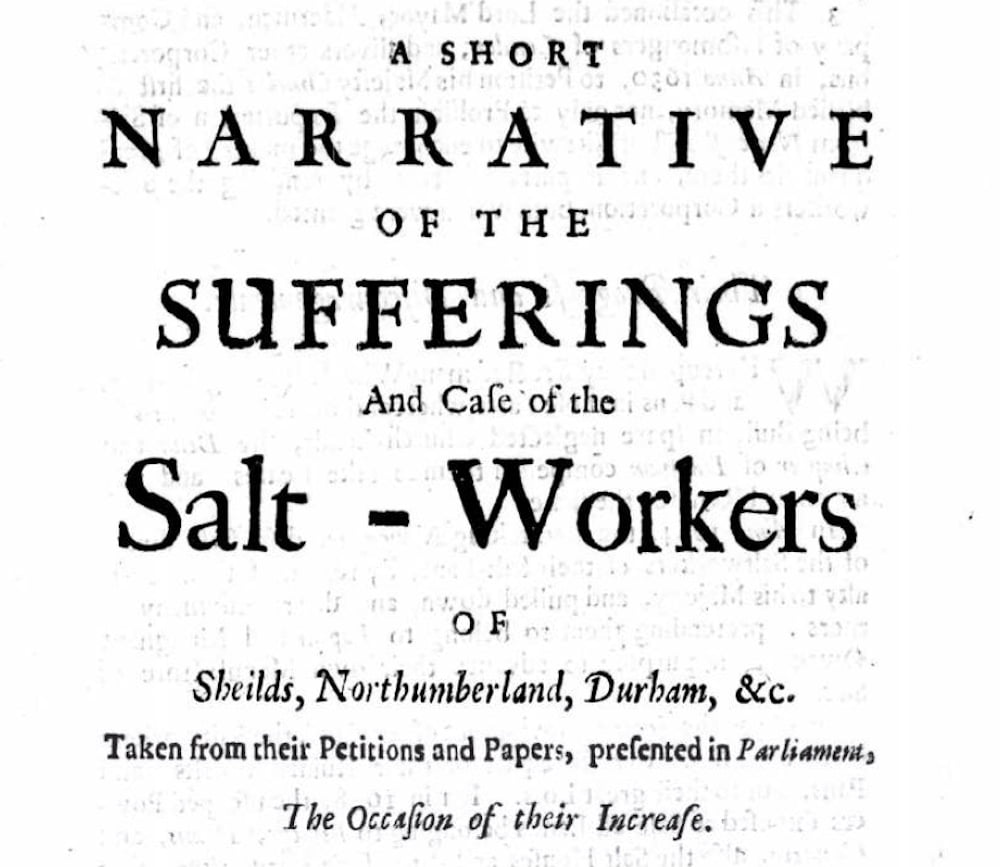C19th/C20th Scottish herring industry dominance linked to the Siege of Newcastle and suffering South Shields saltworkers
SUFFERING SALTWORKERS OF SHIELDS
In the C17th both English and Scottish salt and herring salting had a reputation, at best, for inconsistency. Scotland began to get its act together from the mid-C18th, England lagged behind. It would be useful to explore the economic relationship between Scottish salt production in the C17th and C18th and the growth of Scottish herring curers’ overwhelming dominance in the C19th and C20th.
The historical notion of ‘the industrious Scot’ still has currency, but in the history of salt curing other factors may have come into play. The Scotch Cure was really just the Dutch Cure renamed and branded, but advantage was gained by its earlier promotion. Herring fishery played a key role in economic reconstruction after the 1745 Rebellion and in population retention strategies during The Clearances. Earlier logics emerge, however, in John Collins’ Salt and Fishery (1682).
In his text, Collins includes A Short Narrative of the Sufferings And Case of the Salt-Workers of Sheilds (sic), Northumberland, Durham, &C. Beyond the greed of the English State (kings and Commonwealth), Church and the assorted tax farmers on the state’s behalf, the English saltworkers’ complaint focuses on unfair advantages both taken by the Scots and given to them.
Tax and Its Avoidance
Scottish salt was taxed at point of purchase, English at point of production. With wastage, Collins reports South Shields taxed salt production of 20 wey only resulting in 12 wey sold in London. Similar Scottish salt production would only have been taxed on 12.
In response to complaint and counter complaint, tax levels on salt varied either side of the border, but the English merchants who traded in Scottish salt were effective lobbyists and generally maintained their advantage,
Even more importantly, sales are harder to monitor. With more declaration flexibility, Scottish salt smuggling made a considerable contribution to the capitalisation of the Scottish salt industry and probably of the curers who were replacing the inadequate feudal control of herring fleet investment.
Eliminating the Competition
The salt producers of the Forth were able to evaporate seawater with cheap coal. The sea salt producers of Southern England and the rock salt brine spring producers of Cheshire, Staffordshire and Warwickshire lacked this advantage. The saltworkers of the Tyne, of course, had as much coal as their hearts could desire.

In the English Civil War, in 1644, Alexander Leslie, Earl of Leven and commander of Scotland’s Army of the Solemn League and Covenant, laid siege to Newcastle. In theory, this was a friendly force. Its military support to the English Parliament was in exchange for the promise of a civil and religious union of the Three Kingdoms on the basis of ‘Scottish Rules’ Presbyterianism (Irish sign-up doesn’t seem to have been a consideration).
Leslie did not damage coal production on the Tyne. His strategy was to control the coal trade, as he’d done four years earlier, invading North East England at the head of a technically different army. He used the control to bring pressure to bear on London and the king.
And yet, in 1644, he took the opportunity to destroy the salt pans and salt houses of the Tyne. Collins’ narrative is of an industry, which, nearly 40 years later had still not been able to recover.
The availability of both coal and salt on the Tyne led to the C19th development of the chemical industry – which then moved to Teesside. The railways radically changed the economics of transport and WS Miln’s Scotch East Coast, Orkney and Shetland, Lewis and Barra Herring Fishing (1883) shows Scottish curers mostly using salt from North West England and Lisbon. But by then, they were rapidly expanding into England’s herring stations and bringing Scotland’s herring lasses with them.

1. In Anno 1527, and 1628, in time of Wars with Spain and France, Salt was so scarce, it was sold at 8 s. 9 s. 10 s. a Bushel; and in 1629, upon conclusion of a Peace between England and France, the French-King put out an Edict that none should be Exported, on Confiscation of Goods, and loss of Life.
2. Hence about the same time, Peace being also concluded with Spain, about 200 or 300 Sail of Ships were sent to Spain for Salt, where that King making an advantage of our Necessities, laid an Embargo on the Ships, which being taken off, there followed so great an Imposition on their Salt, that it came to double the price of Salt then and their made, to the Merchants great loss.
3. This occasioned the Lord Mayor, Aldermen, and Company of Fishmongers of London, and divers other Corporations, in Anno 1630, to Petition his Majesty Charles the first of blessed Memory, not only to Prohibit the Exportation of Salt from Newcastle, but likewise to encourage the making of great quantities there, and in parts adjacent, by rendring the Saltworkers a Corporation, both which were granted.
Their Progress and Discouragements.
Whereupon they Erected many Wharfs, Boyling-Houses, and Pans in those Parts, whereof those at South-Sheilds, being Built on spare neglected Church-Lands, the Dean and Chapter of Durham compelled them to take Leases, and pay an annual Rent for the same.
In Anno 1644, the Scots taking Newcastle, dispossest divers of the Saltworkers of their Salt-Pans, by reason of their Loyalty to his Majesty, and pulled down and destroyed many others, pretending them to belong to Popish and Malignant Owners, on purpose to advance their own Manufacture of Salt.
In 1646, the Scots removing out of England, the Saltworkers made hard shift, to restore part of their Ruined Works, and Pans, but to their great Loss. For in 1648, the usurped Powers exposed to Sale all lands belonging to Bishops, Deans, and Chapters, also the Salt Houses and Pans of the Saltworkers, that lived at South-Sheilds being Built upon Church-Lands, they were enforced to purchase the same of the said pretended Powers, or of others who bought them over their heads, at a very dear Rate.
Moreover in 1648, Sir Arthur Haslerig, comming to Command at Newcastle, (to add to their Miseries,) laid on an arbitrary Imposition of 4 s. a Wey on Salt, and as much on a Chaldron of Coals, for the use of the Garrison as he pretended.
From 1644, to June 1647, the-Scotch undermined the Newcastle-Salt workers in their Trade, by an unequal Imposition in the Excise, being a half penny a Gallon, as well on English as Scotch, whereas the Duty on Scotch (being Foreign,) ought to have been as other Foreign Salt, a penny a Gallon, in regard Coals, Labour, and Diet in Scotland, (especially during the time of our Troubles, and heavy Taxes;) were cheaper by one half there, than here.
Besides, the Scots for four years together did not pay Excise, till they had brought their Salt into the Market, and Sold the same; whereas the English-Maker paid Excise at the Pans, besides the Disparity of Measure between Sheilds and London, and the wast by the way, was exceeding injurious to the English Traders, for 20 wey at Sheilds, did not upon delivery make out above 12 wey at London, and sometimes less. Whereas the Scots not paying till a sale in the Market, paid for no more than was really made out.
These Reasons being offered to Parliament, they took off all Excise from English-Salt, to commence from 24 June, 1647, and left but a half-penny a Gallon on Scotch as before.
This notwithstanding proved no Redress, to the long-suffering injured Saltworkers, who upon experience still finding themselves undermined in their Trade, by the Scotch-Salt, obtained an Act of the Rump-Parliament, of 12th June, 1649, Declaring all Salt not made in England, should be understood as Foreign-Salt Imported, and pay Excise accordingly.
Whereupon, immediately a Knot of English Traders in Scottish-Salt, that got great Gains by the Ruin of our own Manufacture, (to uphold their filthy Lucre,) make application to Parliament, to bring on an Excise of a half-penny a Gallon on English-Salt, alledging the necessities of the Common-Wealth, the considerable Revenue that would arise thereby, that Scotch-Salt was better than our own; that we had a considerable Trade thither, which would be lost, unless we took Returns in Scotch-Salt, which would turn to the Merchants great Dammage, unless the Duties between both were well moderated. And accordingly the Rump Parliament, from Midsummer 1649, laid on an half-penny a Gallon on English Salt, and one penny half-penny a Gallon on Scottish, which continued to 1654, during which time the Scottish-Salt undermined the English, notwithstanding it paid 33 s. 4 d. a wey, (of 40 Bushels of 10 Gallons each,) more than the English, by which means above 160 Pans or Works became wast and ruinous, which if restored, would be able to make from 16 to 18 or 20 thousand wey of Salt yearly. which they believe is as much as ever was Imported into the Nation in one year, by Scots or others.
The Rump-Parliament being Dissolved by Oliver Cromwell. the Saltworkers were in hopes to get some relief by that Change, but met with the quite contrary, for the said Oliver and his Council, without staying for the Authority of a pretended Assembly of Parliament, did ordain to Unite Scotland into one Common-Wealth with England; and that all Scotch Goods for the future, should pass as free, and with the like priviledge, as Goods pass from Port to Port in England.
Whence the Saltworkers fell into despair, an no less than 80 Pans more and upwards were Ruined then, reckoning in Impossible to have vent for a great part of the Salt they commonly made, or could have made.
The Saltworkers by his Majesties happy Restauration, were in great hopes to find Encouragement in the said Manufacture of Salt, but have met with the quite contrary in divers Respects.
1. Those of South Sheilds, were inforced to pay considerable Fines, and to take Leases of the Pans, Grounds, Staiths, and Houses, of the Church, to whom the same were Restored.
2. The Saltworkers of Northumberland, Durham, &c. Cheshire, and Lancaster, finding the vent of their Salt, in those Northern-Counties, on the Coasts and in Ireland much obstructed, obtained from the Parliament in 1662, as a compensation of their Sufferings, a high Duty of Customs to be imposed on Scottish-Salt, to wit, a halfpenny a Gallon, that is, !3 s. 4 d. a wey, which yet continues, (whereas French pays but 1 s. and Spanish 1 s. 4d.) But the intent of Parliament in discouraging the said Scotch-Salt is frustrate, by reason a Farm of the Customs of all Foreign Salt Imported hath ever since 1662 been Let, and Expires not till Michaelmas, 1688. The which Farm hath been extreamly prejudicial to the Saltworkers, the Nation, and his Majesties Revenue.
1. To the Saltworkers.
They are informed that by virtue of the specious pretences aforesaid, that Scotch-Salt is better than English; that unless moderated in its Customs, it would breed an enmity between England and Scotland, and prevent all Trade thither, and Returns thence, the farmer hath obtained a considerable Defalcation of 800l. per annum, as granted to admit Scotch-Salt at half Duty of Customs, (as they believe or as bad) the same as they are informed being Subfarmed to the chief Traders in Scotch-Salt, and to Scotch-Men.
By which means, the Condition of the Saltworkers is much worse than formerly, albeit, as aforesaid, when Scotch-Salt paid 13 s. 4 d. a wey more than English, they were undermined in their Trade, and forced to desert 160 Pans.
2. To the Nation.
By reason the said Works did Employ many thousands of poor People and Families, who depend on that Manufacture; who are now reduced to Beggary, and incapacitated to pay Taxes towards the Maintenance of a necessary War, should such happen: The Salt being reduced to such low Rates, that there being nothing to be got; Adventurers give over the Manufacture, having vast quantities on their hands, without any Prospect of Sale thereof, unless to great Detriment, and even when their Condition was at the best, they gave over Working five months in the year, for want of vend, at so low a price as 8 d. a Bushel.
3. To his Majesties Revenue.
In regard the Farm Rent, (if paid into his Majesties Exchequer,) being but 1000 l. per annum, (as some have asserted) is inconsiderable, to be put in ballance with a national injury; and such advantage to his Majesties Revenue, as they have long sollicited to obtain, as a recompense for the loss of the Customs on Foreign.
For Remedy they humbly Crave.
1. That the said Farm may be vacated if possible, by his Majesties Interest, or Let, and Subfarmed to them, if not, that for the future, all Customs on Scotch-Salt, may be Leavied by Sworn Custom House Officers and others.
2. That our Fishermen in the North and Irish-Seas, and at Iceland, be obliged to Lade and take in all their Salt, (to be spent in Fishing) in the Ports of England, before they put to Sea.
As to the Salt of Cheshire, Stafford, and Worcestershire.
The increase thereof is so great, by reason of many new-Brine-Springs, discovered from time to time without the chief Salt-Towns, Seawards, and by the Discouragement put upon their Sales, by reason of Scotch-Salt Imported into Ireland, and French-Salt Imported into the Western parts of England, but more especially in great quantities into Ireland, in return of that great Trade they have with France, for their Flesh &c. since the Act for Prohibiting Irish-Cattle first past, the chief use thereof being to Salt the Beef they Ship off, which is very much, to wit, the Worthy John Ball, Esquire, Justice of Peace, affirms, that his Majesty was informed by an Irish Earl, that no less than 48 thousand barrels of Irish Beef, weighing 2 C. and a half weight each, had in a years time been Landed at Dunkirk only, from such like causes it comes to pass, that many thousands of poor Labouring Families are undone, and the Proprietors of Works and Pits reduced also to a wretched Condition. A Share that formerly yielded 60 l. a year, Rent or Benefit, not now rendring above 6 l. Salt being reduced to 6 d. a Bushel at Northwich, the most eminent Salt-Town in Cheshire, whereas of the Brine, there and in other places of the County, vast quantities of Salt may be made, far excelling either Scotch or French, in goodness.
Lastly, As a most effectual remedy to their Agreivances, I might name Honourable, or Eminent Persons of Cheshire, Newcastle, and Hants, who have long by themselves or Agents sollicited to bring on a small Excise, (or Duty payable on Salt at the Works) on Native-Salt, on Condition to discourage Foreign, by a high duty of Customs, as an ample Compensation to his Majesty for the loss thereof, and for the advancement of the Fishery.
See also
- BALDIE
- BRITISH FISHERY
- CALLER HERRIN’ (FILM)
- CALLER HERRIN’ (SONG)
- ENGLAND’S PATH TO WEALTH AND HONOUR
- FIFIE
- HARENG SAUR MONOLOGUES
- HERRING LASSES
- HERRING’S HEAD
- LOCKMAN, JOHN
- LUGGER
- QUOTAS
- RING NETTING
- SALT
- SHOALS OF HERRING, THE
- SINGING THE FISHING
- SMITH, ADAM: WEALTH OF NATIONS
- SOVEREIGN OF THE SEAS
- ULLAPOOL
- WHITE HERRING
- YAWL
- ZULU
